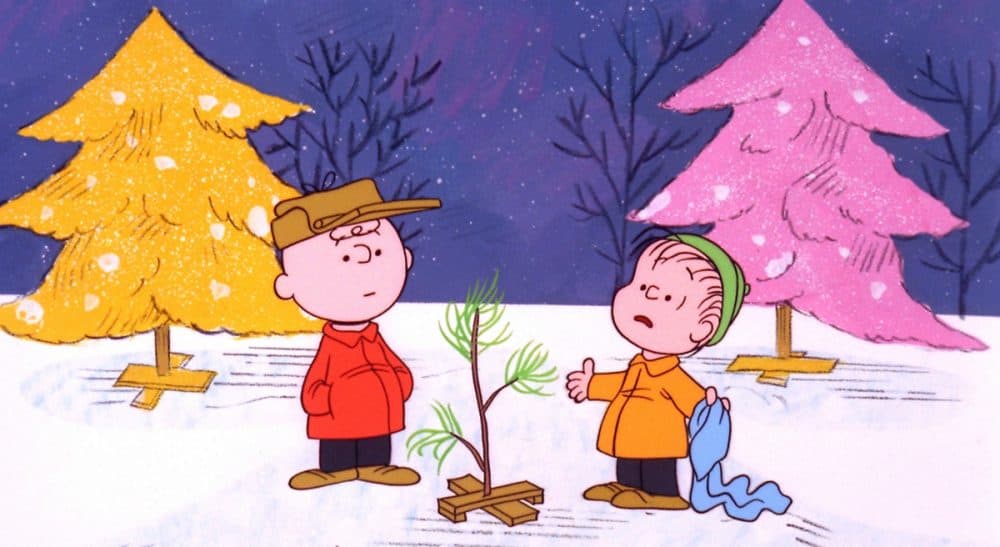Advertisement
50 Years On, 'A Charlie Brown Christmas' Is The Gift That Keeps On Giving

“I think there must be something wrong with me, Linus. Christmas is coming, but I'm not happy,” Charlie Brown complains. “I just don't understand Christmas, I guess. ... I always end up feeling depressed.”
Holiday depression. Commercialization. Malaise. The meaningless of Christmas.
The venerable holiday cartoon special, "A Charlie Brown Christmas," based on the comic strip "Peanuts" by Charles M. Schulz, turns 50 this month. The annual TV tradition made its airwaves debut on CBS, Dec. 9, 1965.
"A Charlie Brown Christmas” was groundbreaking, daring to point out the hypocrisy of turning a holy religious holiday into a shopping orgy. It was, in its way, a harbinger of a new, self-aware age. In the mid-1960s, America was about to be overturned by a cultural revolution, one that questioned the foundation of the previous decade: authority, traditional values and an American Dream that championed progress at any cost. The 25-minute show brazenly critiques the exploitation of the holiday, and laments the secularism of Christmas.
'A Charlie Brown Christmas' was groundbreaking, daring to point out the hypocrisy of turning a holy religious holiday into a shopping orgy.
As the always cynical Lucy puts it, “We all know that Christmas is a big commercial racket. It's run by a big eastern syndicate, you know.”
How far we as a culture had drifted! For its day, "A Charlie Brown Christmas” was a wakeup call. The idea that we should be dragged down by dark moods at Christmas like Charlie Brown — “I know nobody likes me. Why do we have to have a holiday season to emphasize it?” — was a radical notion. America exhaled a sigh of relief. Someone else feels the way I do.
The plot centers on Charlie Brown, who finds himself depressed. Not only does his sister Sally write to Santa, saying, “Just send money. How about 10s and 20s?”, Snoopy blings out his dog house with decorations, and wins the top prize. “My own dog gone commercial. I can't stand it,” our favorite hair-impaired, loveable-loser protagonist says.
Then Lucy suggests Charlie direct the kids’ annual Christmas pageant. Mocked and ridiculed by his peers, he nonetheless finds redemption and the true meaning of Christmas, when he calls to the heavens, “Isn't there anyone who knows what Christmas is all about?” and Linus answers his prayer with his famous on-stage soliloquy that begins with, “And there were in the same country shepherds abiding in the fields, keeping watch over their flocks by night” and ends with the slam-dunk “Glory to God in the highest, and on Earth peace, good will toward men.” That scene, and later when the kids finally embrace Good Ole Charlie Brown (at least for a moment) and begin to sing “Hark the Herald Angels Sing,” still brings tears to my eyes.
I grew up in the 1970s, in a non-believing household. My childhood understanding of God and all things Christianity amounted to as much as would fit on the head of a pin. Not only did the show teach me important lessons about humility, community and perseverance, it also schooled me on what Christmas is all about — namely, the birth of Jesus.
Nowadays, no one seems to fret over what Christmas has become. We accept that the holiday is secular and commercial. Pointing out the season’s hypocrisy seems old-fashioned.
Not only did the show teach me important lessons about humility, community and perseverance, it also schooled me on what Christmas is all about...
Yet, the gift of "A Charlie Brown Christmas” is to let viewers travel back in time to a more naive phase in our cultural development, to feel what Charlie Brown feels, and to be reminded that Christmas can have a deeper meaning, if we so choose.
The quaint, 2-D, hand-drawn and low-fi animation technique — especially now seen in comparison to the new digital "Peanuts Movie" -- reminds us that a simple story from a simpler time on the cusp of huge changes, can still be magically relevant.
I close with an ironic aside: Even though the TV special touted its famous anti-commercial message, the show would have died on the animators’ drawing desk without support from Coca-Cola, which originally even snagged a product placement in early broadcasts of the cartoon.
Good grief, indeed.

